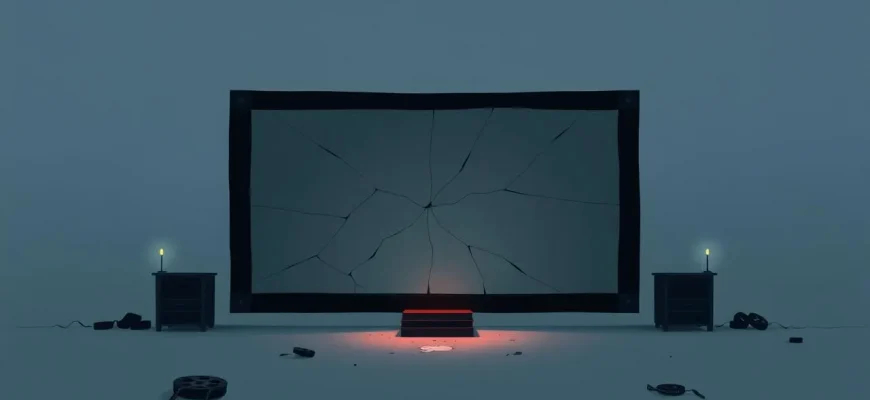Welcome to the shadowy realm of cinema where the line between entertainment and discomfort blurs. This curated list of the "Top 10 Most Disturbing Films of All Time" isn't for the faint-hearted. These films delve into the depths of human psyche, exploring themes that are often too intense or controversial for mainstream audiences. Whether it's through graphic violence, psychological horror, or unsettling themes, these movies have left an indelible mark on viewers, challenging perceptions and often sparking debates. Here's your guide to some of the most twisted cinematic experiences, each with its own unique brand of shock value.

The Girl Next Door (2007)
Description: Based on the true story of Sylvia Likens, this film depicts the horrific abuse and torture of a teenage girl by her aunt and neighborhood children. Its graphic portrayal of cruelty and the banality of evil is deeply unsettling.
Fact: The film was initially banned in Australia due to its disturbing content but was later released with an R18+ rating.
 Watch Now
Watch Now 
The Human Centipede (First Sequence) (2009)
Description: A mad scientist kidnaps three tourists to create a "human centipede" by surgically connecting their digestive systems. Its premise alone is enough to make it one of the most disturbing films, known for its body horror and grotesque concept.
Fact: The film was inspired by a joke made by the director about a punishment for child molesters.
 Watch Now
Watch Now 
Salò, or the 120 Days of Sodom (1975)
Description: Pier Paolo Pasolini's adaptation of the Marquis de Sade's novel is set in Fascist Italy, where four libertines subject a group of teenagers to extreme sexual and psychological torture. Its explicit content and political allegory make it one of the most disturbing films ever made.
Fact: Pasolini was murdered shortly after the film's completion, leading to speculation that his death was connected to the film's controversial content.
 30 Days Free
30 Days Free 
Cannibal Holocaust (1980)
Description: This Italian exploitation film features a documentary crew who go missing in the Amazon, only for their footage to reveal their descent into savagery. It's infamous for its real animal cruelty and the found-footage style that blurs the line between fiction and reality.
Fact: The director was arrested for murder after the film's release due to its realistic portrayal of violence, though he was later acquitted.
 30 Days Free
30 Days Free 
Irreversible (2002)
Description: Told in reverse chronological order, this French film explores the aftermath of a brutal rape and the subsequent revenge. Its graphic violence, particularly a nine-minute rape scene, has made it notorious for its intensity and emotional impact.
Fact: The film's director, Gaspar Noé, used a strobe effect in one scene to induce nausea in viewers, enhancing the film's disorienting experience.
 30 Days Free
30 Days Free 
Antichrist (2009)
Description: Lars von Trier's exploration of grief, guilt, and nature's cruelty, where a couple retreats to a cabin in the woods after the death of their child, only to face psychological and physical horrors. Its graphic depictions of sex and violence have polarized audiences.
Fact: The film won the Best Actress award at the Cannes Film Festival for Charlotte Gainsbourg, despite its divisive reception.
 30 Days Free
30 Days Free 
Martyrs (2008)
Description: A tale of revenge and existential horror, where a woman seeks vengeance for her childhood trauma, leading to a descent into a secret society's brutal experiments on human endurance and transcendence.
Fact: The film was remade in Hollywood in 2016, but it did not achieve the same level of notoriety or critical acclaim as the original.
 30 Days Free
30 Days Free 
A Serbian Film (2010)
Description: This Serbian horror film delves into the darkest corners of human depravity, following a retired porn star who unknowingly agrees to star in a snuff film. Its graphic content and controversial themes have made it one of the most banned films worldwide.
Fact: The film was banned in several countries, including Spain, Brazil, and Malaysia, due to its extreme content. It also sparked a debate about artistic freedom versus censorship.
 30 Days Free
30 Days Free 
Men Behind the Sun (1988)
Description: A Chinese film that dramatizes the atrocities committed by Unit 731, a secret biological and chemical warfare research unit of the Imperial Japanese Army during World War II. Its depiction of human experimentation is both graphic and harrowing.
Fact: The film was banned in several countries due to its graphic content, but it has since been recognized for its historical accuracy.
 30 Days Free
30 Days Free 
I Spit on Your Grave (1978)
Description: A woman brutally raped by a group of men takes revenge in a series of violent acts. Known for its explicit violence and rape-revenge theme, it's often cited as one of the most controversial films in cinema history.
Fact: The film was banned in several countries and was at the center of debates about censorship and the portrayal of violence against women in media.
 30 Days Free
30 Days Free 








